Serving 549 students in grades 6-8, Brown Barge Middle School ranks in the top 10% of all schools in Florida for overall test scores (math proficiency is top 10%, and reading proficiency is top 10%).
The percentage of students achieving proficiency in math is 82% (which is higher than the Florida state average of 52%). The percentage of students achieving proficiency in reading/language arts is 81% (which is higher than the Florida state average of 52%).
The student:teacher ratio of 25:1 is higher than the Florida state level of 17:1.
Minority enrollment is 44% of the student body (majority Black), which is lower than the Florida state average of 65% (majority Hispanic).
Quick Stats (2025)
- School Type: Magnet School
- Grades: 6-8
- Enrollment: 549 students
- Student:Teacher Ratio: 25:1
- Minority Enrollment: 44%
- Overall Testing Rank: Top 10% in FL
- Math Proficiency: 82% (Top 10%)
- Reading Proficiency: 81% (Top 5%)
- Science Proficiency: 60-64% (Top 30%)
- Source: National Center for Education Statistics (NCES), FL Dept. of Education
Top Rankings
Brown Barge Middle School ranks among the top 20% of public schools in Florida for:
Category
Attribute
Overall Rank
Math Proficiency
Reading/Language Arts Proficiency
School Overview
Brown Barge Middle School's student population of 549 students has stayed relatively flat over five school years.
The teacher population of 22 teachers has declined by 21% over five school years.
School Type
Grades Offered
Grades 6-8
Total Students
549 students
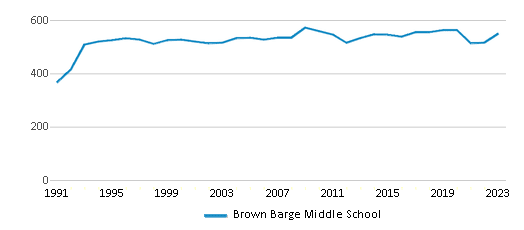
Gender %
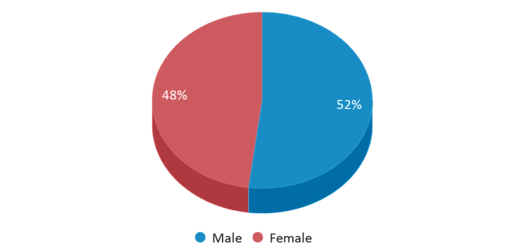
Total Classroom Teachers
22 teachers
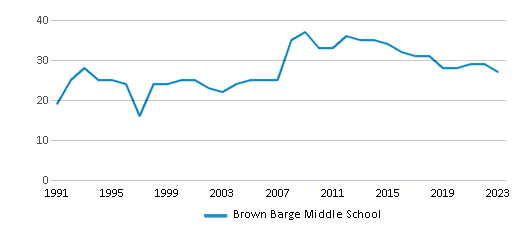
Students by Grade
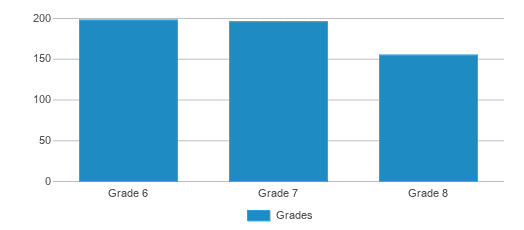
School Rankings
Brown Barge Middle School ranks within the top 10% of all 3,704 schools in Florida (based off of combined math and reading proficiency testing data).
The diversity score of Brown Barge Middle School is 0.64, which is less than the diversity score at state average of 0.70. The school's diversity has stayed relatively flat over five school years.
Overall Testing Rank
#188 out of 3704 schools
(Top 10%)
(Top 10%)
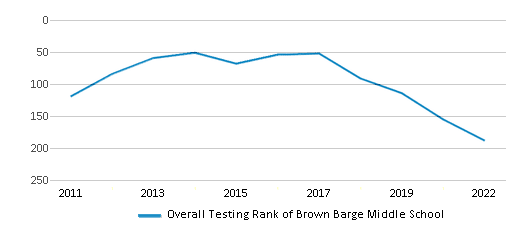
Math Test Scores (% Proficient)
82%
52%
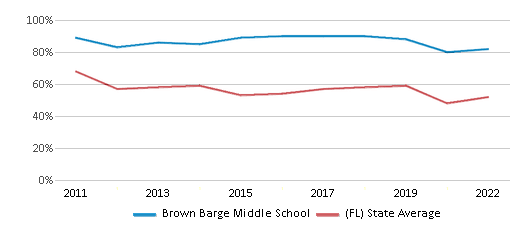
Reading/Language Arts Test Scores (% Proficient)
81%
52%
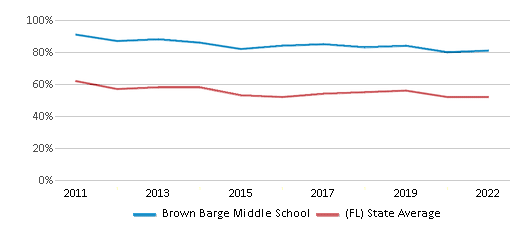
Science Test Scores (% Proficient)
60-64%
52%
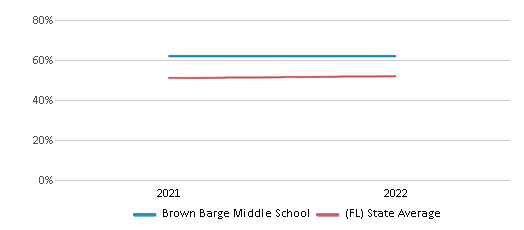
Student : Teacher Ratio
25:1
17:1
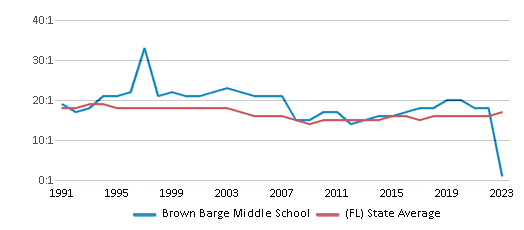
American Indian
n/a
n/a
Asian
6%
3%
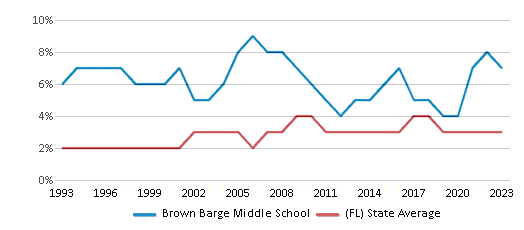
Hispanic
9%
37%
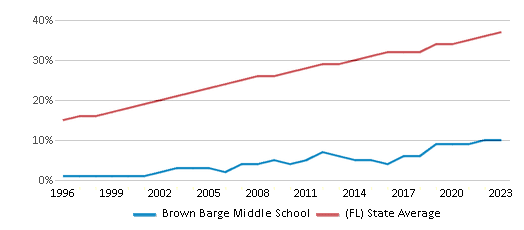
Black
16%
21%
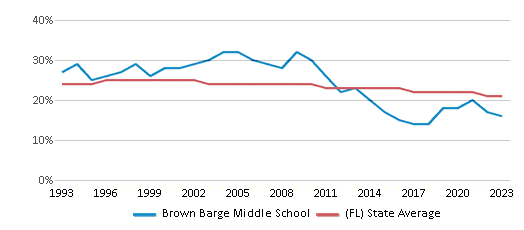
White
56%
35%
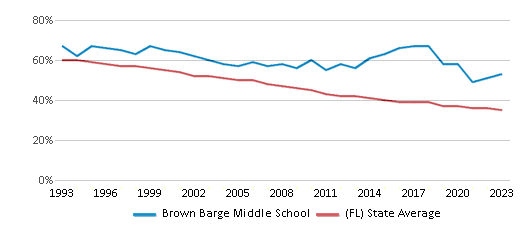
Hawaiian
1%
n/a
Two or more races
12%
4%
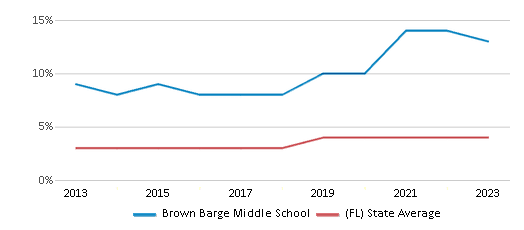
All Ethnic Groups
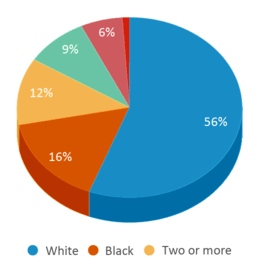
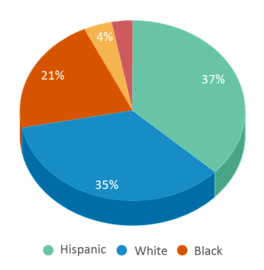
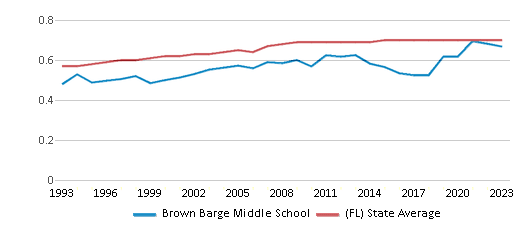
Participates in the National School Lunch Program (NSLP)
Yes
Eligible for Free Lunch
29%
47%
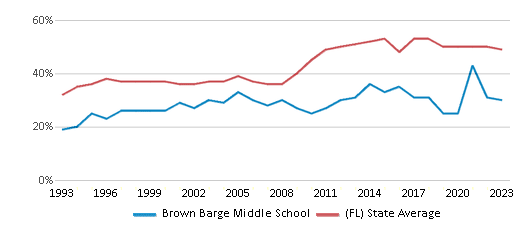
Eligible for Reduced Lunch
7%
4%
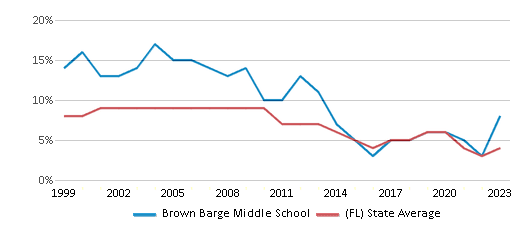
School Statewide Testing
School District Name
Source: National Center for Education Statistics (NCES), FL Dept. of Education
Profile last updated: 02/09/2025
Frequently Asked Questions
What is Brown Barge Middle School's ranking?
Brown Barge Middle School is ranked #188 out of 3,704 schools, which ranks it among the top 10% of public schools in Florida.
What schools are Brown Barge Middle School often compared to?
Brown Barge Middle Schoolis often viewed alongside schools like Beulah Academy Of Science, J. H. Workman Middle School by visitors of our site.
What percent of students have achieved state testing proficiency in math and reading?
82% of students have achieved math proficiency (compared to the 52% FL state average), while 81% of students have achieved reading proficiency (compared to the 52% FL state average).
How many students attend Brown Barge Middle School?
549 students attend Brown Barge Middle School.
What is the racial composition of the student body?
56% of Brown Barge Middle School students are White, 16% of students are Black, 12% of students are Two or more races, 9% of students are Hispanic, 6% of students are Asian, and 1% of students are Hawaiian.
What is the student:teacher ratio of Brown Barge Middle School?
Brown Barge Middle School has a student ration of 25:1, which is higher than the Florida state average of 17:1.
What grades does Brown Barge Middle School offer ?
Brown Barge Middle School offers enrollment in grades 6-8
What school district is Brown Barge Middle School part of?
Brown Barge Middle School is part of Escambia School District.
In what neighborhood is Brown Barge Middle School located?
Brown Barge Middle School is located in the North Central Pensacola neighborhood of Pensacola, FL. There are 4 other public schools located in North Central Pensacola.
School Reviews
5 4/11/2022
Great school, if you're willing to keep up. Lots of work, but you get opportunities and get to do fun things at this school you won't get at many schools. for example,t the renaissance fair, walk for impact, special field trips, etc.
5 9/15/2021
very good school, highly recommend.
5 5/11/2018
I have went here for all of my middle school career and have NEVER SEEN A THIRD GRADER. Nice school, but the lunch tastes bad. Got some cool kids, but the band is really small. This hjuh person must be a robot, because teachers do care a lot about you students and love helping us learn.
2 4/11/2011
Very unfair school. They don't care nothing about you student, at all. If your child is left behind, the teachers don't care. All they care about is their paycheck.
Review Brown Barge Middle School. Reviews should be a few sentences in length. Please include any comments on:
- Quality of academic programs, teachers, and facilities
- Availability of music, art, sports and other extracurricular activities
Recent Articles

What Is A Charter School?
Explore the world of charter schools in this comprehensive guide. Learn about their history, how they operate, and the pros and cons of this educational innovation. Discover key facts about charter schools, including admission policies, demographics, and funding, as well as what to look for when considering a charter school for your child.

10 Reasons Why High School Sports Benefit Students
Discover the 10 compelling reasons why high school sports are beneficial for students. This comprehensive article explores how athletics enhance academic performance, foster personal growth, and develop crucial life skills. From improved fitness and time management to leadership development and community representation, learn why participating in high school sports can be a game-changer for students' overall success and well-being.

February 05, 2025
Understanding the U.S. Department of Education: Structure, Impact, and EvolutionWe explore how the Department of Education shapes American education, from its cabinet-level leadership to its impact on millions of students, written for general audiences seeking clarity on this vital institution.









